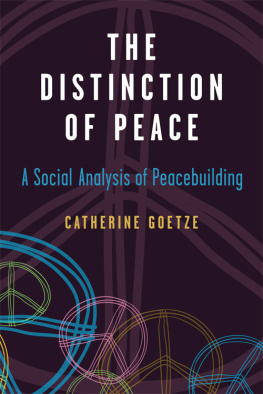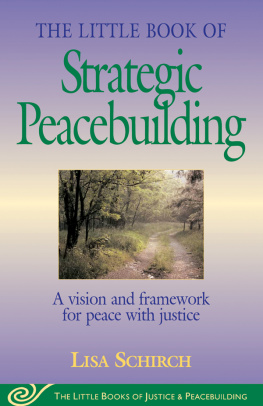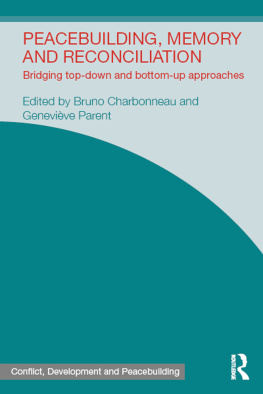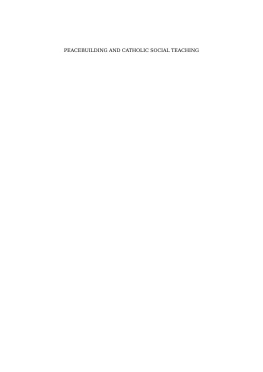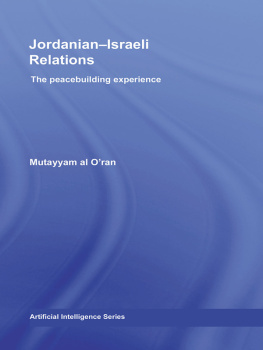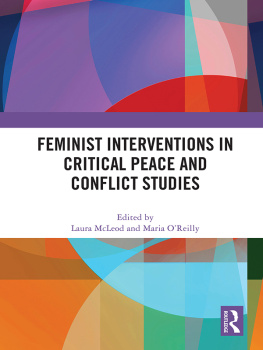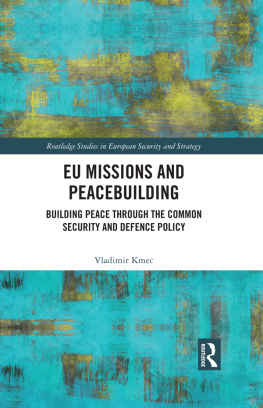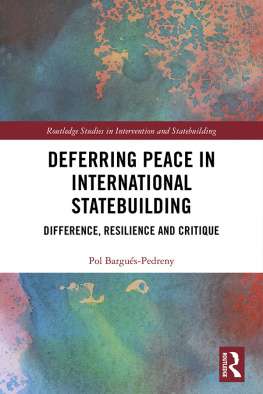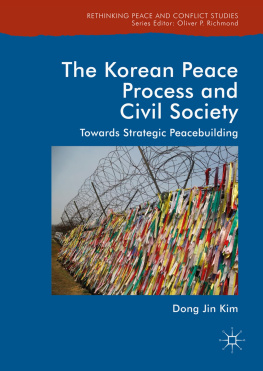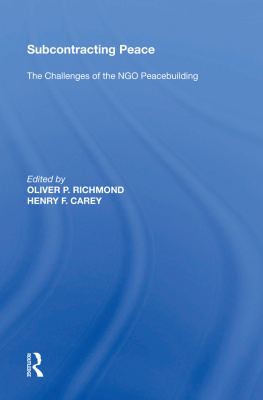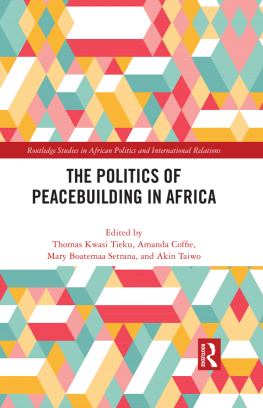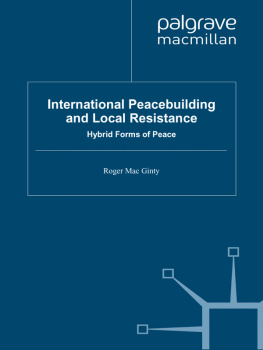Catherine Goetze - The Distinction of Peace: A Social Analysis of Peacebuilding
Here you can read online Catherine Goetze - The Distinction of Peace: A Social Analysis of Peacebuilding full text of the book (entire story) in english for free. Download pdf and epub, get meaning, cover and reviews about this ebook. year: 2018, publisher: University of Michigan, genre: Politics. Description of the work, (preface) as well as reviews are available. Best literature library LitArk.com created for fans of good reading and offers a wide selection of genres:
Romance novel
Science fiction
Adventure
Detective
Science
History
Home and family
Prose
Art
Politics
Computer
Non-fiction
Religion
Business
Children
Humor
Choose a favorite category and find really read worthwhile books. Enjoy immersion in the world of imagination, feel the emotions of the characters or learn something new for yourself, make an fascinating discovery.
- Book:The Distinction of Peace: A Social Analysis of Peacebuilding
- Author:
- Publisher:University of Michigan
- Genre:
- Year:2018
- Rating:3 / 5
- Favourites:Add to favourites
- Your mark:
- 60
- 1
- 2
- 3
- 4
- 5
The Distinction of Peace: A Social Analysis of Peacebuilding: summary, description and annotation
We offer to read an annotation, description, summary or preface (depends on what the author of the book "The Distinction of Peace: A Social Analysis of Peacebuilding" wrote himself). If you haven't found the necessary information about the book — write in the comments, we will try to find it.
The Distinction of Peace: A Social Analysis of Peacebuilding — read online for free the complete book (whole text) full work
Below is the text of the book, divided by pages. System saving the place of the last page read, allows you to conveniently read the book "The Distinction of Peace: A Social Analysis of Peacebuilding" online for free, without having to search again every time where you left off. Put a bookmark, and you can go to the page where you finished reading at any time.
Font size:
Interval:
Bookmark:
 Page i
Page i Peacebuilding serves as a catch-all term to describe efforts by an array of international organizations, nongovernmental organizations, and even agencies of foreign states to restore or construct a peaceful society in the wakeor even in the midstof conflict. Despite this variety, practitioners consider themselves members of a global profession. In this study, Catherine Goetze investigates the genesis of peacebuilding as a professional field of expertise since the 1960s, its increasing influence, and the ways in which it reflects global power structures.
Step-by-step, Goetze describes how the peacebuilding field came into being, how it defines who belongs to it and who does not, and what kind of group culture it has generated. Using an innovative and original methodology, she investigates the motivations of individuals who become peacebuilders, their professional trajectories and networks, and the good peacebuilder as an ideal. For many, working in peacebuilding in various waysas an aid worker on the ground, as a lawyer at the United Nations, or as an academic in a think tankhas become not merely a livelihood but also a form of participation in world politics. As a field, peacebuilding has developed its techniques for incorporating and training new members, yet its internal politics also create the conditions of exclusion that often result in practical failures of the peacebuilding enterprise.
By providing a critical account of the social mechanisms that make up the peacebuilding field, Goetze offers deep insights into the workings of Western domination and global inequalities.
Catherine Goetze is Senior Lecturer in International Relations at the University of Tasmania.
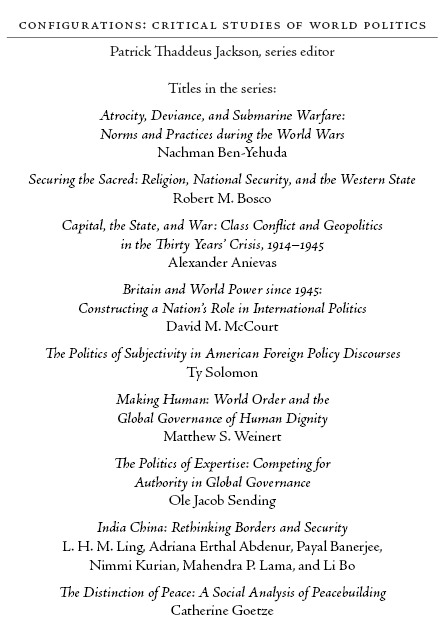 Page ii Page iii
Page ii Page iii Catherine Goetze
University of Michigan Press
Ann Arbor
Page iv Copyright 2017 by Catherine Goetze
All rights reserved
This book may not be reproduced, in whole or in part, including illustrations, in any form (beyond that copying permitted by Sections 107 and 108 of the U.S. Copyright Law and except by reviewers for the public press), without written permission from the publisher.
Published in the United States of America by the
University of Michigan Press
Manufactured in the United States of America
A CIP catalog record for this book is available from the British Library.
Library of Congress Cataloging-in-Publication data has been applied for.
ISBN: 978-0-472-07341-2 (hardback)
ISBN: 978-0-472-05341-4 (paperback)
ISBN: 978-0-472-12268-4 (e-book)
Page v Meiner Mutter
Page vi Page viiBNUBUnited Nations Office in Burundi
CIACentral Intelligence Agency
CICCenter on International Cooperation
CSCEConference for Security and Cooperation in Europe
DPKODepartment of Peacekeeping Operations
ECEuropean Communities
ICVAInternational Council of Voluntary Agencies
IMFInternational Monetary Fund
IRInternational Relations
KFORKosovo Force
KPIkey performance indicators
MINURSOUnited Nations Mission for the Referendum in Western Sahara
MINUSCAUnited Nations Multidimensional Integrated Stabilization Mission in the Central African Republic
MINUSMAUnited Nations Multidimensional Integrated Stabilization Mission in Mali
MINUSTAHUnited Nations Stabilization Mission in Haiti
MONUCUnited Nations Organization Mission in the Democratic Republic of the Congo
MONUSCOUnited Nations Organization Stabilization Mission in the Democratic Republic of the Congo
Page x NAACPNational Association for the Advancement of Colored People
NATONorth Atlantic Treaty Organization
NGOnongovernmental organization
OASOrganization of American States
OCHAOffice for the Coordination of Humanitarian Affairs
OECDOrganisation for Economic Co-operation and Development
ONUBUnited Nations Operation in Burundi
ONUCOpration des Nations Unies au Congo/United Nations Operation in the Congo (196064)
OSCEOrganization for Security and Co-operation in Europe
P5Five permanent members of the Security Council
SFORStabilization Force
SWOTstrengths, weaknesses, opportunities, threats
UNUnited Nations
UNAMAUnited Nations Assistance Mission in Afghanistan
UNAMIUnited Nations Assistance Mission for Iraq
UNAMIDAfrican Union/United Nations Hybrid Operation in Darfur
UNDPUnited Nations Development Programme
UNFICYPUnited Nations Peacekeeping Force in Cyprus
UNHCHRUnited Nations High Commissioner for Human Rights
UNHCRUnited Nations High Commissioner for Refugees
UNIOBGISUnited Nations Integrated Peacebuilding Office in Guinea-Bissau
UNMIKUnited Nations Interim Administration Mission in Kosovo
UNMILUnited Nations Mission in Liberia
UNMISSUnited Nations Mission in the Republic of South Sudan
UNMOGIPUnited Nations Military Observer Group in India and Pakistan
UNOCIUnited Nations Operation in Cte dIvoire
UNPROFORUnited Nations Protection Force
UNSCOLUnited Nations Special Coordinator for Lebanon
UNSMILUnited Nations Support Mission in Libya
UNSOAUN Support Office for African Union Mission in Somalia
Page xiIt took seven years to do the research for this book and write it. That is a long time. And yet I would not have been able to achieve this had I not been privileged to get so much support from all sides. My biggest thanks go to to all the friends with whom I had discussed my experiences as consultant to the German Red Cross in the early 2000s: Vanessa and Mladen Pupavac, Uta Bronner, Dejan Guzina, David Chandler, Roland Albert, Wolf-Dieter Eberwein.
The grant application that was born out of these discussions, Who Governs? A Social Analysis of UNMIK, was successful, and without the generous support of the British Academy I would not have started working on this topic. Luckily, I had a brilliant research assistant who not only led all the interviews in Kosovo much better than I would have been able to do, but who also subsequently became a great friend and coauthor. Thank you, Berit Bliesemann de Guevara, for accompanying this project and all the support.
For most of of the time working on this book I have been Head of the School of International Studies at the University of Nottingham Ningbo China. I have to thank the University of Nottingham and in particular Richard Aldrich and Roger Woods for this great opportunity. Yet the wonders of discovering China and the enigma of university management drained a lot of time and energy from this project, and without the most wonderful support from my colleagues David Kiwuwa, May Tan-Mullins and Teresa Wang I would never have been able to even dream of writing Page xii this book. Xiexie! Rosaria Franco, Joseph Askew, Anna Greenwood, Gernot Klantschnig, Ivaylo Gatev, and Raffaela Puggioni, too, have done all they could to keep my back free. Thank you! At UNNC I also benefited from the research support of Rob Avery-Phipps, Mesach Ampwera, Li Kanzhen, Hong Shuning, Huang Antian, Hu Mengyao, Le Tian, Liu Haoran, Liu Xianan, Li Xiaochen, Li Yunze, Ren Yujia, Wang Danyan, Wang Zhou, You Yue, Zhang Naitong, Zhang Yifan, Zheng Xiaojie, Dong Jacob, and Chini Okorie. Thank you all, you did a great job!
Font size:
Interval:
Bookmark:
Similar books «The Distinction of Peace: A Social Analysis of Peacebuilding»
Look at similar books to The Distinction of Peace: A Social Analysis of Peacebuilding. We have selected literature similar in name and meaning in the hope of providing readers with more options to find new, interesting, not yet read works.
Discussion, reviews of the book The Distinction of Peace: A Social Analysis of Peacebuilding and just readers' own opinions. Leave your comments, write what you think about the work, its meaning or the main characters. Specify what exactly you liked and what you didn't like, and why you think so.

